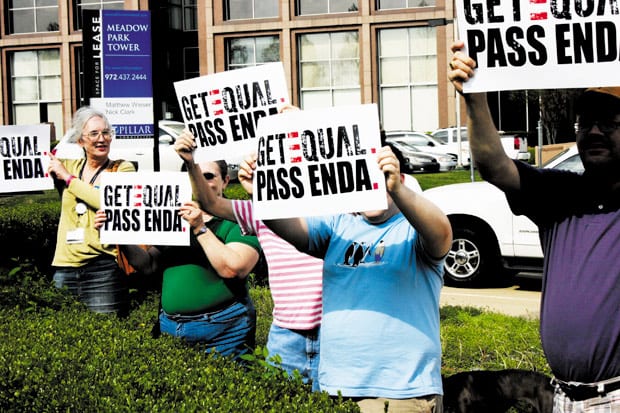In the race to win hearts and minds, national LGBT advocates say the equality movement has a ways to go


JAMES RUSSELL | Staff Writer
Even should the Supreme Court rule in favor of marriage equality this month in Obergefell v. Hodges, national advocates say there’s a long way to go before the LGBT community achieves full equality.
“The Supreme Court decision would be a victory,” said Ineke Mushovic, executive director of Movement Advancement Project, a national LGBT advocacy group in Denver.
“People could marry but many may still be fired based on their sexual orientation or gender identity.”
In fact, according to MAP’s latest report Mapping Equality, looking at LGBT protections, or lack thereof, in each state, 52 percent of LGBT people would be at risk of being fired from their jobs, kicked out of their homes, or denied access to doctor’s offices and restaurants.
One alarming conclusion from the report reveals the considerable gaps between protections for lesbian, gay and bisexual people versus trans people.
It was the first thing Rea Carey, executive director of the National LGBTQ Task Force, noted. “Ninety percent of trans people experience discrimination or harassment in the workplace,” she said.
While the lack of legislation protecting LGBT people from job or employment discrimination may be motivated by political animus or bias, not all Americans are opposed to protections. “Many Americans simply don’t realize people can be fired from their jobs simply based on their sexual orientation or gender identity or expression,”
Mushovic said. They believe LGBT people are already protected.
With marriage equality all but certain, advocates believe employment nondiscrimination is the next major priority for the equality movement.
According to the Human Rights Campaign, 29 states do not protect job discrimination based on sexual orientation. 32 states have no such protections based on gender identity or expression. Texas protects neither.
Texas legislators during the most recent legislative session attempted to rectify that, to no avail.
Bills like HB 187 by Rep. Senfronia Thompson, D-Houston, and SB 65 by Sen. Rodney Ellis, D-Houston, would have broadened the state’s employment and wage discrimination codes to prohibit discrimination based on sexual orientation, gender identity and expression.
Additionally, HB 2860 by Rep. Diego Bernal, D-San Antonio, would have prohibited housing discrimination based on sexual orientation, gender identity or expression.
Past, present, future
Comprehensive employment nondiscrimination legislation has been introduced in Congress during all but one legislative session since 1974. Beside partisan politics, one unfortunate hurdle in passing legislation has been opposition to transgender protections. That was made clear when Rep. Barney Frank, a Massachusetts Democrat who has since retired, introduced the bill but then stripped trans protections from it. While the Employment Nondiscrimination Act has since then been introduced with transgender protections, noted Gender Rights Maryland Executive Director Dana Beyer, they largely have gone nowhere.
One legislative victory turned out to not be any victory at all for many LGBT groups. In 2013, the Senate easily passed a trans-inclusive version of ENDA. But LGBT rights groups pulled their support for it over sweeping religious liberty exemptions that would have allowed faith-based organizations and people of faith to skirt the law. The House did not schedule it for a vote.
There’s currently little momentum for federal legislation in the conservative Republican-controlled Congress. As such, victories have played out not in Congress but at the executive level and in the courts.
One such decision came in 2012 when the Equal Opportunity Employment Commission issued a unanimous landmark ruling protecting transgender people. The commission based on Title VII of the Civil Rights Act of 1964 ruled discrimination against a transgender employee or applicant is illegal sex discrimination.
The case was brought by the Transgender Law Center on behalf of Mia Macy who was denied a job at the Bureau of Alcohol, Tobacco, Firearms and Explosives.
Last summer, President Barack Obama signed an executive order barring discrimination based on gender identity or sexual orientation for federal contractors. He also extended protections based on gender identity to all federal employees.
“[The EEOC] is a major advancement in transgender rights that will provide a significant tool to fight discrimination. It will also help us advocate for still needed protections, ENDA and the federal contractors executive order,” National Center for Transgender Equality Executive Director Mara Keisling said at the time.
So where is there hope?
Mushovic pointed to state-level advances, like Utah, where a local push in progressive Salt Lake City fueled passage for a statewide bill barring discrimination for LGBT people in employment and housing.
“Local progress has [also] been helpful,” she said.
Not just legalities
The battle for LGBT equality won’t end with marriage equality or with employment nondiscrimination.
There’s more to LGBT issues than just marriage, discrimination or job protections. It’s about changing hearts and minds through interpersonal interactions, coming out and telling stories.
“We want a whole approach, not just legal recognition,” Carey said. “We need to be free to be ourselves in every area of our lives. Whether it’s a young lesbian couple holding hands or safely attending church with your partner.”
Traditional LGBT groups must also partner with other leaders for justice. She ticked off any number of issues facing the LGBT community, including many of who are often overlooked.
“We have to guarantee the safety of LGBT immigrants in detention centers. We’re still talking about voting rights even after the Civil Rights Act! Just because we’ve made progress doesn’t mean we have to defend it,” she said.
“We’ll continue to see opponent legislation pop up but we’re hopeful with the Supreme Court decision that public opinion will continue to change. A positive marriage equality decision from the Supreme Court wouldn’t impact nondiscrimination protections,” Mushovic said. “We have far to go.”
To read the full Mapping Equality report visit Lgbtmap.org/file/mapping-equality.pdf.
This article appeared in the Dallas Voice print edition June 19, 2015.


